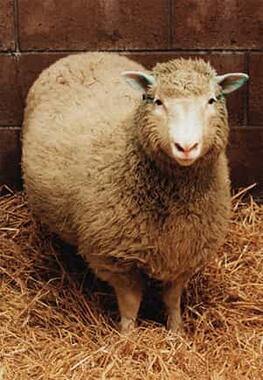Should Humans Be Cloned?
When Dolly the sheep became the first clone to be created from an adult mammal cell, people wondered if someday humans might be cloned. Even if this were possible, there are many questions. Is it right to clone humans? Should there be laws against it? Some people say that it's unnatural to create an exact copy of another person. On the other hand, cloning is an important technique that can be used in medicine. Even if humans were cloned, the clone would grow up to be a very different person because it would have different life experiences.
How: In humans, identical twins form when a fertilized egg splits in the womb at a very early stage. These twins are natural clones.
Animals that have been cloned: sheep, gaur
(an endangered cow), dairy cows, mice
News: In 1996, scientists cloned a baby sheep from the DNA of an adult sheep (Dolly).
Significance: could help to increase production of livestock and improve medical research

Armadillos give birth to babies that are clones of:
each other
their parents
their fathers
Correct!
Armadillo babies are clones of each other. Once a year, the armadillo produces a single egg. After it's fertilized, it divides in four and grows into identical quadruplets.
Clones are identical in every single way.
Fiction
Clones may have exactly the same DNA, but it takes more than just genes to determine who a person is. Where you live, the people you know, and luck make us unique in many ways.
By using ancient DNA, scientists can create clones of extinct animals such as dinosaurs and woolly mammoths.
Fiction
Extinct animals can be cloned only in fantasy movies. With current technology, ancient DNA is too damaged and incomplete to be cloned.




 Biodiversity
Biodiversity
 Brain
Brain
 Genetics
Genetics
 Marine BiOLogy
Marine BiOLogy
 MicrobiOLogy
MicrobiOLogy
 PaleontOLogy
PaleontOLogy
 ZoOLogy
ZoOLogy
 AnthropOLogy
AnthropOLogy
 ArchaeOLogy
ArchaeOLogy
 Astronomy
Astronomy
 Climate Change
Climate Change
 Earth
Earth
 Physics
Physics
 Water
Water
